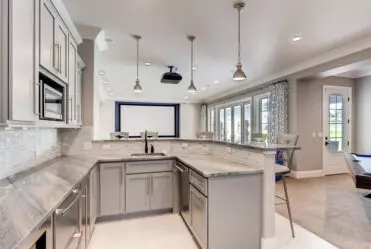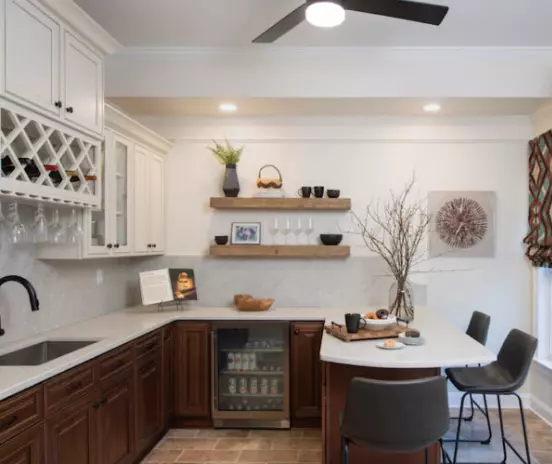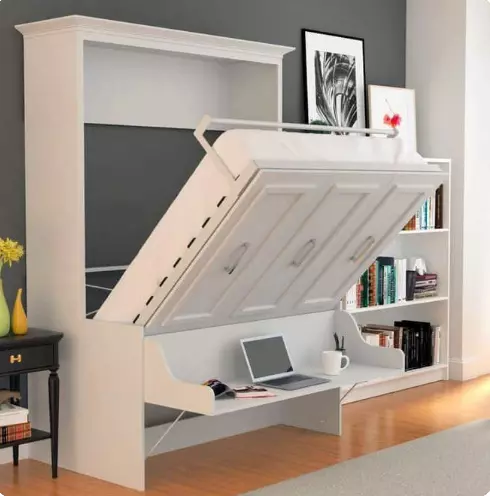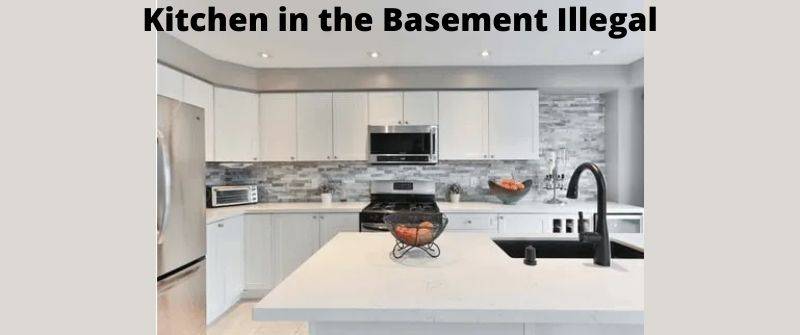Is it illegal to have a kitchen in your basement? For some, the answer is yes. Many jurisdictions across the nation are implementing laws and regulations for secondary dwelling units, including kitchens residing in a basement.
Follow these tips to ensure your basement kitchen walls are safe and comply with any building code as advised by your contractor.
It is not illegal to have a kitchen in your basement if your building plan was well designed and approved by the relevant authorities in your state or country. With valid permits, you can include your kitchen in the basement, whether domestic or commercial. However, rules can change if it is your only kitchen.

If you live in New York City, the city requires two exits and a window in every room.
Plus, you need two working smoke detectors.
If there is no window and a second exit, that room cannot serve as a bedroom or kitchen.
A basement with only one exit would not pass an inspection for a Certificate of Occupancy, even if the floor above does not serve the same purpose as a living space.
In addition to not being legal, it does not make sense from the point of view of fire safety. If a fire starts upstairs, your only way out may get barriers by flames or smoke.
List of States where Basement Kitchen is Illegal
If you are planning to add a kitchen to your basement, you must know that it is illegal to have a kitchen in some states in some states.
A kitchen in the basement is not illegal in most United States. However, it is illegal in some cases as it depends on the state you live in and what type of kitchen you have.
The list of states where it is illegal to have a kitchen in the basement includes:
- Maryland
- North Carolina
- Nevada
- Delaware
- Utah
- New Yolk
Ideas to put the Kitchen in the Basement

A basement kitchen is a great way to improve the value of your home.
It also increases the living space in your house and can make it more attractive to potential buyers if you are considering selling.
You do not have to own a mansion or a very large home to install a basement kitchen.
You only need about 160 square feet of space and a little bit of creativity to make this work for you.
Here are some ideas for putting a kitchen in the basement:
1. Replace the Doors and Windows
One of the first things you will want to do before moving your kitchen to the basement is replace any windows and doors. It is especially important for basements that are already in place over an extended period.
Replace both doors and windows with energy-efficient options to keep moisture and mold at bay. Replacing these elements will also help deter pests from entering your home via the basement.
2. Add some fresh Paint
Once you’ve replaced all your doors and windows, it is time to add some fresh paint to the walls of your new kitchen space. Check with your local paint store to find a product resistant to mold and mildew growth, as kitchens tend to get very humid in general.
]Apply two coats of primer before adding two coats of paint to seal any cracks or holes that may allow moisture into the drywall.
3. Install a Murphy bed

If you have a small, open living room area in your basement used for storage or as an office, consider installing a Murphy bed there.
This bed will fold into the wall during the day to create an open, multi-functional living space that includes your new kitchen area.
It can be folded down and used as a guest bedroom when needed in the evening.
One can customize it with built-in shelving and cabinets perfect for storing plates, silverware, cooking accessories, and spices while providing an organized look to your new kitchen area.
4. Install new Flooring or Carpeting
You can give your kitchen a new facelift by installing new flooring or carpeting. It is a great idea if you want to enjoy a luxurious feel. You will be injecting more life and changing the right mood.
Importance of Building Codes
Typically, you should follow the building codes for the following reasons:
- Building codes work to establish minimum standards of safety for structures. They rely on accepted building practices and engineering principles intended to provide for the public’s health, safety, and welfare.
- Unlike zoning laws, which regulate lot size and where you can build, building codes do not control what you can do inside your house or on your property. They regulate how you do it so that if there’s a fire or some other catastrophe, you will get out alive, and firefighters will be able to get in and rescue anyone left inside.
For example, there are minimum clearances required around exterior doors to open without hitting a window wall or other obstruction in many jurisdictions today. There are also requirements concerning egress windows in bedrooms — windows that must provide a means of escape in case of fire or another emergency.
There are often rules about the maximum height of railings on decks and stairs, even though these structures may not technically be part of the house.

As a homeowner, I am specifically keen on home improvement. I am passionate about homes, yards, and home improvement. I blog on home ideas and reviews on solutions that make homes better.
